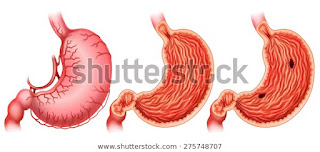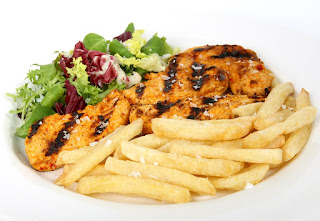STOMACH ULCER: CAUSES, SYMPTOMS, DIAGNOSIS AND CURE
By: Dr. M. Kamran Amiri
And The Living Legend
Ahmad Javed Kamran Amiri
Dated: Sunday 24th
November 2019
Everything
about gastric ulcer and its cure you must have heard of gastric ulcer. It means
some kind of benign damage to the stomach. K. is "Peptic Ulcer". In
the not too distant past, lifestyles were thought to be the root cause of
stomach ulcers, or stressful occupations, but nowadays doctors have discovered
that the main cause of the ulcer is not stress or diet but infection with a
specific bacterium called Helicobacter pylori.
The bacterium is present in saliva and is transmitted through the use of the spoon and fork of the infected person or the eating of other people's semi-functional food, according to Dr. M. Kamran Amiri. Some drugs, such as aspirin, ibuprofen, naproxen, ketoprofen, and some medicines for the treatment of arthritis (joint pain and arthritis), can cause gastric ulcer, so you should not take any medication without consulting Doctor. Smoking and alcohol are other causes of gastric ulcer. Symptoms of gastric ulcer The most common symptom of gastric ulcer is burning pain that can be felt from the chest to the umbilical cord. This pain is caused by gastric acid contact with the injury area. The pain starts from one hour after eating and lasts for hours. It also flares up at night and can wake one up. This pain worsens when the stomach is empty, so hunger should be avoided. Gastric ulcer can subside for a while, but after a few weeks the symptoms return, so you should see a doctor for treatment. In few cases, other signs and symptoms of gastric ulcer are seen:
The bacterium is present in saliva and is transmitted through the use of the spoon and fork of the infected person or the eating of other people's semi-functional food, according to Dr. M. Kamran Amiri. Some drugs, such as aspirin, ibuprofen, naproxen, ketoprofen, and some medicines for the treatment of arthritis (joint pain and arthritis), can cause gastric ulcer, so you should not take any medication without consulting Doctor. Smoking and alcohol are other causes of gastric ulcer. Symptoms of gastric ulcer The most common symptom of gastric ulcer is burning pain that can be felt from the chest to the umbilical cord. This pain is caused by gastric acid contact with the injury area. The pain starts from one hour after eating and lasts for hours. It also flares up at night and can wake one up. This pain worsens when the stomach is empty, so hunger should be avoided. Gastric ulcer can subside for a while, but after a few weeks the symptoms return, so you should see a doctor for treatment. In few cases, other signs and symptoms of gastric ulcer are seen:
* Vomiting
(Elevation of blood), indicated by red or black.
*
Dark blood in the stool or feces tan
*
Nausea or vomiting
*
Weight loss for no reason
*
Appetite change that one should see a doctor as soon as possible. It should be
noted, however, that not all pain is a gastric ulcer.
The
most important illness that has symptoms similar to a stomach ulcer is a heart
attack, so avoid self-treatment. The doctor uses an endoscope to diagnose
gastric ulcer. In the endoscopic procedure, the doctor looks at the inside of
the stomach through a narrow tube that enters your stomach and the head is
light, and may sample the inner layer of the stomach (like, remove a piece) to
check for Helicobacter pylori. Blood tests and breathing tests are also used to
diagnose Helicobacter pylori. Usually in young people, if there are no symptoms
such as weight loss, anemia, vomiting and food sensation and only gastric pain,
they should receive a blood test and a breath test for Helicobacter pylori and
be treated if proven. But in people who are over 40 years old or have anemia,
nausea or vomiting or food sensation, endoscopy is a must because gastric
cancer is common in our country. Treatment of gastric ulcer if you have H.
pylori, you should be on a multi-drug antibiotic treatment for two months.
Also, gastric acid-lowering drugs such as ranitidine, famotidine, omeprazole,
etc. help reduce gastric pain. If gastric ulcer has severe bleeding, endoscopy
may be necessary to burn and reduce bleeding. Surgery may be required if the
bleeding is not controlled by endoscopy or the wound is punctured. When you see
a peptic ulcer doctor, there is no wound that you can treat alone without
referring to your doctor. Although acid-blocking drugs and antacids relieve
pain, this recovery is short-lived. If you see any signs or symptoms of a sore,
be sure to see a doctor for treatment; on the other hand, your stomach pain may
be a sign of another serious illness, such as a heart attack, so if you go to
the doctor with a stomach ache and ask for a heart examination Don't be
surprised. Risk of gastric ulcer Most people with gastric ulcer have only gastric
pain. Some people have no symptoms at all. Wounds can also cause other physical
problems; sometimes they bleed. If the wounds get too deep, they can puncture
the stomach wall. Wounds can also cause gastric obstruction, preventing food
from passing through the stomach, which can lead to nausea, vomiting, and
weight loss. If you see any of the following warning signs, see your doctor
immediately.
1.
Blood Vomiting
2.
Elevation of vomiting food that is eaten a few hours or days ago.
3.
Feeling cold or wet
4.
Feeling abnormal or dizzy
5.
Blood stool (blood may make your stool black or pale)
6.
Feeling persistent nausea or frequent vomiting
7.
Feeling severe and sudden pain
8.
Sustainable weight loss
9.
Pain is not decreasing by taking medicine.
10.
Pain in the back of the body.
1.
Increase the number of meals and reduce the volume of each meal so that your
stomach is not empty.
2.
Eat slowly and chew the food very well.
3.
Avoid smoked meats and salted fish and salted nuts.
4.
Reduce consumption of tea, coffee and carbonated drinks.
5.
Don't smoke or drink alcohol.
6.
Eat calmly and avoid stress.
7.
Avoid depression, discomfort and stress and just laugh. So go for the
therapeutic laugh!
8.
Never take aspirin or painkillers like Brofen. In common pain you can take
acetaminophen.
9.
It is recommended that patients with this disease avoid eating a large meal
before bedtime.
10.
In the past, milk was an important food in wound healing.
11. Drink a lot of water.
12. Drink milk.
13. Avoid eating hot meals.
STOMACH ULCER: CAUSES, SYMPTOMS, DIAGNOSIS AND CURE
 Reviewed by World of Lore
on
November 23, 2019
Rating:
Reviewed by World of Lore
on
November 23, 2019
Rating:
 Reviewed by World of Lore
on
November 23, 2019
Rating:
Reviewed by World of Lore
on
November 23, 2019
Rating:
















No comments: